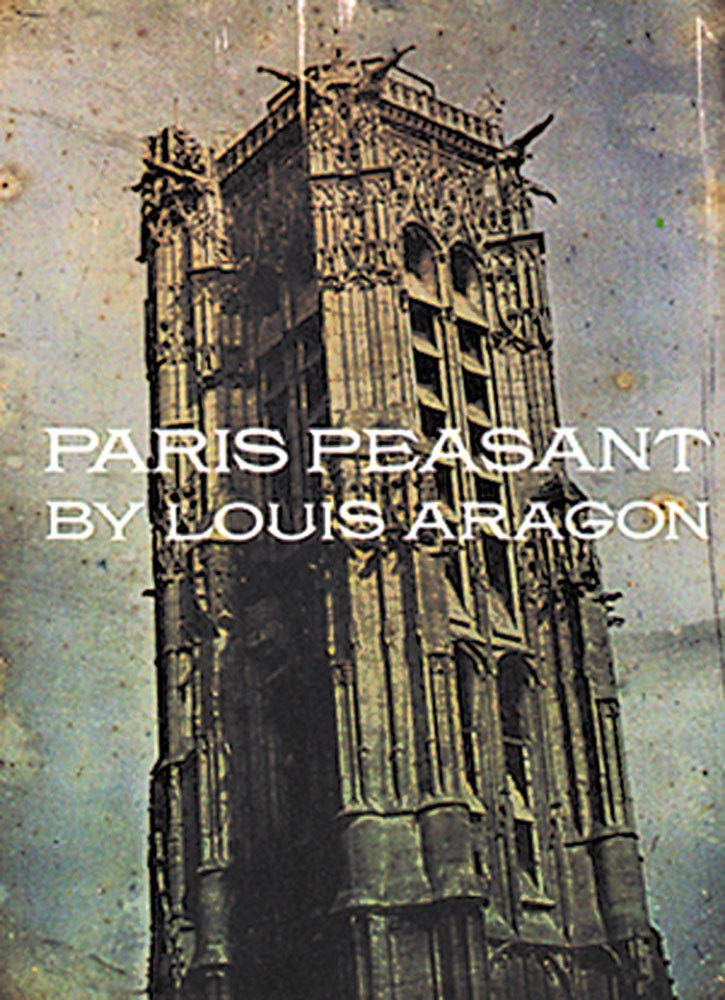Customer Services
Copyright © 2025 Desertcart Holdings Limited


Paris Peasant
T**8
Surrealist classic by Louis Aragon
Aragon, along with Andre Breton and a couple others, were the leading Surrealists in the five or six years following the end of WWI. Paris Peasant is a key novel from this short, intense period. Of course, it’s a ‘novel’ in only the loosest sense. There is no plot or characters, and one of Aragon’s goals was to sweep away such standard trappings in order to force readers to enter his work with no expectations or critical tools. So, in sum, Paris Peasant is not an easy read, especially as it’s not always clear when Aragon is being sincere or sarcastic about a subject in his crosshairs. Additionally, Paris Peasant was published in installments in a Surrealist magazine of the time, so it’s possible that what impresses in small chunks inundates at novel length. But it is a rewarding read if you’re into this sort of thing. There are many passages brimming with beautiful prose poem text, and the largest section of the novel describes a covered arcade in Paris teetering between respectability and disreputability that is so detailed it’s like entering a memory in Albus Dumbledore’s pensieve. It includes scenes of cafes where the young men launching the Surrealist movement met. Thematic purpose is provided through Aragon’s discussions of ‘modern myth’ and the differences and overlaps between metaphysics, logic, and abstraction that lie at the root of Surrealism’s theoretical underpinnings. Not that I necessarily followed all that. To do so, I’d need to spend a lot more time parsing Aragon’s meandering, artsy-fartsy style. And I’m not sure there’d be much point in the effort. The Surrealists prioritized abstract impression over the concrete, which means it’s possible Aragon would have viewed any attempt to ‘understand’ him as tediously bourgeoise. (Exact Change edition)
B**A
A classic that is entirely too unread.
This is an overlooked classic. Aragon challenges our ideas of the novel without getting to over-the-top. It's an intense memoir that takes place in a very small area of Paris.
Z**M
Beyond surrealism.
Beyond surrealism. Aragon knew too well of the pitfalls associated with surrealist writings, and here offers up an extremely lucid portrait of the minutia of Parisian life, only acquired through intense observation, keen understanding, imagination, and a sense of humor.
J**N
Five Stars
A+
A**R
http: //PayRefe. net/index. php?
http://PayRefe.net/index.php?ref=274920
G**1
Five Stars
good book
R**E
Not as good as Nadja, Les Champs Magnetiques, et al.
Louis Aragon, Paris Peasant (Gallimard, 1926)Aragon, one of the people at the core of the dada, and later the surrealist, movements in France, is a fantastic poet, like most of them were. However, I'm finding, as I move out to explore the prose of the movements after twenty years of enjoying (and being influenced by) the poetry, that most of them were far better poets than they were novelists. There are exceptions, of course (Rene Daumal's unfinished Mount Analogue and Breton/Eluard's Les Champs Magnetiques both made my best-reads-of-the-year list in the early nineties), but Paris Peasant isn't one of them.The book's not bad, for what it is, but it could have been so much more. It encompasses three prose works of Aragon's, two of which seem to be that curious mixture of fiction and nonfiction which has become so popular in recent years, and the third of which is indescribable by normal means other than to say it's prose. The first is a travelogue of sorts, a kind of gutter-level guidebook to an area of Paris that most tourists likely stayed well away from. At a hundred twelve pages, it's by far the longest piece in the book. It's also written in almost stream-of-consciousness style, with no real attempt at coherence or flow, making it a more difficult read than it needed to be. The second details an evening Aragon spent with Breton and Marcel Noll strolling through Paris; it's the strongest of the three, the only one where Aragon's long diversions (which are likely to put one in mind of James or Joyce, though Aragon lacks the command of language of either; that, however, could easily be the fault of the translator rather than Aragon himself) really seem as if they're contributing to the piece, rather than distracting. The third, "The Peasant's Dream," doesn't really seem to fit into the short story or memoir categories; it's tempting to hang the godawful "flash fiction" moniker on it, or it would be were it not fifteen pages long. It's not bad, really, but it's not all that great, either; it's just there.A minor, at best, work in the surrealist catalogue. There are many other things that belong in your collection before you set your sights on this one. ** ½
M**S
I agree with the review below.
This book is good, but it's not that good. It's a nice little time capsule. Someone who is not interested in turn of the century Paris or surrealism probably wouldn't enjoy it that much.
R**L
Welcome to the frontiers of the imagination.....
'Le paysan de Paris' is one of those unique works, a unique work that has been very much a part of my life.There are 5, or so, copies on my shelves from various decades and in various states of aging. This edition isa welcome addition to those shelves.An intelligent and sensitive translation into English by Simon Watson Taylor, that retains all the richness ofLuis Aragon's original surréaliste prose, his word plays and for you the chance insights into the wonders of theimagination.Good front cover too!.
G**N
No en el idioma que yo quería
Estaba en inglés .Creía que estaba en francés.Decepción
H**H
Excellent
Excellent book and perfect execution
T**R
Five Stars
One of the greatest of the original Surrealist texts from the 1930's
K**G
Thanks!
On time and as described. A good read! Some more useful information and atmosphere from the wonderful city of Paris.
Trustpilot
2 weeks ago
1 month ago